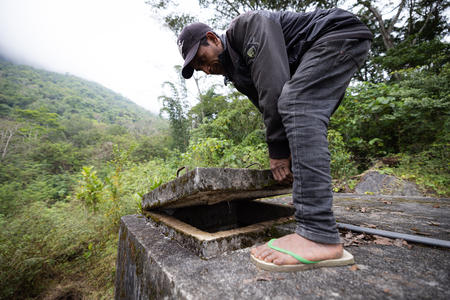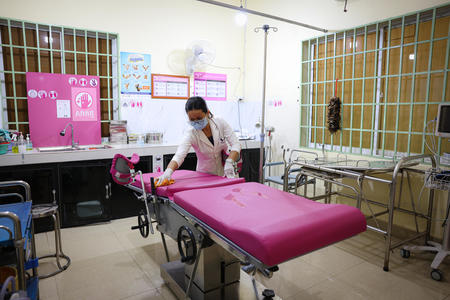Water for Women
The effects of a lack of clean water and decent toilets are felt most by women and girls. They experience this in a number of ways, whether that be walking long distances to collect water, facing the danger and indignity of finding a place to defecate when they don’t have a private toilet, or being excluded from decisions about services. Meaningful participation from women and girls is key to delivering water and sanitation services that meet their needs, as well as changing harmful norms that see them marginalised.
Water for Women is an Australian Government funded program that aims to improve health, gender equality and well-being in Asia-Pacific through inclusive water, sanitation and hygiene (WASH) projects. WaterAid Australia is funded to deliver projects in Timor-Leste and Papua New Guinea (PNG).
Key activities in Timor-Leste include:
- strengthening rural WASH planning, and operations and maintenance systems, to emphasise the importance of climate resilience integration;
- working with sub-national actors to review and trial different tools and approaches to identify a scalable model of climate resilient and inclusive WASH in rural communities. This could include water source protection and recharge; community-led water resource management; nature-based solutions; and tech solutions to monitor water tank levels and usage patterns; and,
- strengthening Gender Equality, Diversity and Social Inclusion integration in WASH planning, monitoring and accountability mechanisms.
Key activities in Papua New Guinea include:
- supporting local level government and the East Sepik Provincial Health Authority to increasingly take ownership of inclusive, climate resilient WASH service delivery in Wewak;
- improving inclusive, climate resilient WASH service delivery levels in Wewak district;
- supporting the District Development Authority, local level government and the East Sepik Provincial Health Authority to take action to reduce inequalities experienced by women and people with disabilities; and,
- utilising evidence from the project to help WASH sector actors to strengthen inclusive, climate resilient WASH in other PNG locations.
Further information can be found here.
Catchment-wide water resource management
Funded by the Swedish International Development Agency, this project is supporting two catchment areas in Timor-Leste, one each in Liquica and Manufahi, to sustainably manage their ecosystem through community-based water management approaches. This will include:
- strengthening government structures for water resource management (WRM), including agreeing clear roles and responsibilities of different actors;
- strengthening water level and flow data monitoring systems so that climate and water supply data can be more readily available and used to inform WRM decision-making; and,
- assessing specific climate risks in each catchment and constructing nature-based solutions to address these, including to protect water sources and stabilise soil.
Pacific Menstrual Health Network
Across the Pacific, adolescent girls, women and gender diverse people who menstruate experience fear, shame and discrimination. They also face practical challenges such as a lack of menstrual products, limited water infrastructure and toilets, or health services to managing menstruation.
The Pacific Menstrual Health Network is a collection of women’s groups, gender equality activists and social enterprise that are bringing voices together from Papua New Guinea, Solomon Islands, Fiji, Vanuatu and Samoa to improve menstrual health outcomes in the region creating joint advocacy agendas, evidence and best practice menstrual hygiene solutions.
WaterAid and partners are undertaking scoping and policy analysis to lay the foundations for progressing menstrual health, supported by a series of country case studies to document how change happens, and best practice tools and approaches. This project is supported by the Australian Government through the Australian NGO Cooperation Program (ANCP). The project is:
- led by multi-sectoral Pacific actors and is a platform to share ideas on best practice; emerging evidence; guidance materials and information;
- driving collective action and advocacy on menstrual health: actors will be supported to lead national-level action, coordination and represent their country's progress; and,
- promoting a greater shared understanding of menstrual health among diverse actors of the key opportunities to bring about improved menstrual health outcomes.
WASH services in Healthcare Facilities in Cambodia
Water, sanitation and hygiene are crucial elements for a healthcare facility to be hygienic and provide safe and effective care to patients. Without these three essentials, patients and staff are at greater risk of infection and other diseases, especially if they are pregnant, elderly, or have a disability.
Funded by Who Gives Crap (WGAC) and the Swedish International Development Cooperation Agency (Sida), this project focuses on improving management of inclusive climate resilient WASH infrastructure in two healthcare facilities in Kampong Chhnang Province. The project is strengthening the capacity of healthcare management, clinical and cleaning staff at the two healthcare facilities to appropriately manage water, sanitation and hygiene services and ensure a safe and hygienic environment.
As part of this project, WaterAid has also been working with health authorities to protect against antimicrobial resistance and improve infection, prevention and control procedures for several years. The project will work at the national level to strengthen collective action to prioritise climate-resilient and inclusive WASH services in healthcare facilities across the country.


